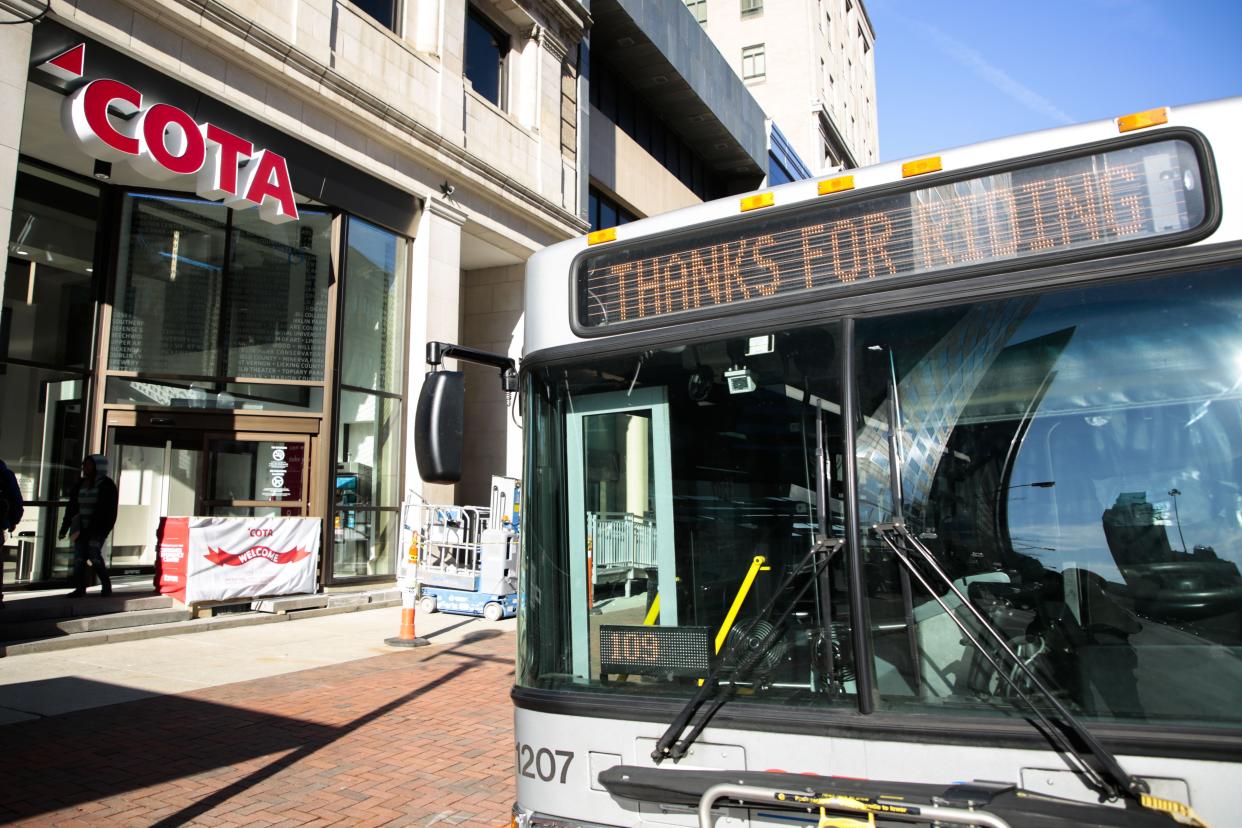COTA board to vote in August on capital budget, extending C-pass in Short North

The Central Ohio Transit Authority's board of trustees will schedule a special meeting in August to consider adoption of its latest $395.7 million capital budget, extending the C-pass program for free bus rides in the Short North and making permanent a reduced-fare program for low-income riders.
The proposed capital budget for 2023-27 includes a new $19 million Rickenbacker Mobility Center at Groveport and London-Groveport Road near Rickenbacker International Airport. The COTA board previously approved the project in its 2021 five-year capital plan.
COTA received $3.75 million in federal funds through the Mid-Ohio Regional Planning Commission and a $1 million state grant to help pay for the transit center, said Andy Biesterveld, COTA's chief engineering and mechanical officer.
The transit agency also is pursuing more federal funds for the project, which COTA chief financial officer Angel Mumma said in January 2021 would cost $6.75 million.
COTA's proposed Rickenbacker transit center: What it means for area workers, residents
The transit center will provide stops for COTA fixed routes and serve as a transit hub with last-mile shuttle service to the many employers near the airport. COTA is talking with Pickaway Area Rural Transit and Lancaster-Fairfield Public Transit as well as Groveport Rickenbacker Employee Access Transit shuttle service to connect with the hub.
The center will also provide child care and possibly health care services, as well as food from the Mid-Ohio Food Collective.
The proposed capital budget also includes:
$98 million to support the electrification of COTA's transit fleet, including improving grid capacity and charging at bus depots and along routes;
$10 million to renovate COTA's Downtown headquarters, 33 N. High St.;
$3.75 million for the Reynoldsburg Park & Ride so it can accommodate more buses and parking;
$421,000 to repair the Linden Transit Center at Cleveland and East 11th avenues.
Biesterveld said the money dedicated to the proposed five-year capital budget is not contingent on a sales tax hike.
COTA officials said earlier this month that they decided not to place a 0.5% sales tax hike on the November ballot because of the economy. The agency continues to pursue millions in federal money to pay for bus rapid transit lines, known as the LinkUS initiative.
In other matters at its special meeting, the COTA board will consider:
Extending C-pass program in the Short North
The board is expected to approve $50,000 to extend the pilot C-pass program in the Short North, where workers, residents and visitors who apply for the monthly card can ride buses for free.
The program began in May, and the $50,000 that paid for the pilot was already used up by June 15, said Betsy Pandora, executive director of the Short North Alliance.
Those funds paid for 800 unique riders and 6,000 rides, she said. She said 65% of the rides were taken by people who work in the Short North.
"It speaks to just the need for the potential for a meaningful option," Pandora said. "It's becoming a critical component in providing an equitable workforce benefit."
The first $50,000 came from parking fees collected in the Short North parking benefits district. COTA would pick up the tab for the next $50,000.
Making digital fare cut for low-income riders permanent
The COTA board plans to vote on whether to make permanent a 50% fare reduction for low-income riders using the system's digital fare system. In January, the board voted to reduce fares for riders if they present proof of one of the following: Supplemental Nutrition Assistance Program food assistance; publicly funded child care; Ohio Works First cash assistance; Medicaid; Prevention, Retention and Contingency emergency assistance; or Temporary Assistance to Needy Families.
In addition, COTA would add the Women, Infants and Children nutrition program to that list.
Four Nines Technologies, a California-based transit consulting firm, estimated that based on 2019 (pre-COVID) ridership, COTA would lose $1.3 million a year in revenue with the low-income program.
As it is, COTA had to take $31.3 million from its reserves to balance its $194.7 million operating budget for 2022 as expenses continued to outpace revenues. The agency received about $100 million in federal CARES Act money in 2020 and 2021 to help weather the COVID-19 pandemic.
Extending COTA Plus on-demand service
The COTA board also plans to vote to extend the COTA Plus on-demand transit service through the end of the year. The service area includes Polaris Parkway, Uptown Westerville, Mount Carmel St. Ann's Hospital and Otterbein University.
The city of Westerville would pay $7,450 to extend the end of service hours from 8 p.m. to 11 p.m. Thursdays and Fridays through the end of 2022.
The COTA board must schedule a special meeting to consider all of these issues because it didn't have a quorum of seven members Wednesday at its regular meeting. Half of the 12 board members were missing, including Lori Elmore, Jennifer Gallagher, Sean Mentel, Doug McCollough, Raja Sundararajan and Kumi Walker.
Board chairman Craig Treneff said he can't ever remember not having enough members for a quorum.
mferench@dispatch.com
@MarkFerenchik
This article originally appeared on The Columbus Dispatch: COTA board to meet on capital budget, C-pass expansion

